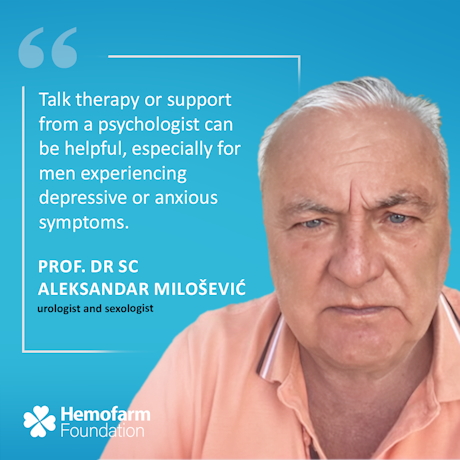
12/11/2024
Male Menopause
Prof. Dr. Sc. Aleksandar Milošević
Urologist and Sexologist
Male Menopause
Andropause, often referred to as "male menopause," includes the changes happening in men during middle age, typically in their 40s or 50s, due to a decline in testosterone levels. It is a gradual process that can manifest with a wide range of symptoms.
Symptoms and Clinical Picture
•
Reduced sexual function: This symptom may include a decrease in libido, erectile dysfunction, and reduced energy for sexual activities.
•
Reduced muscle mass and strength: The decrease in testosterone affects muscles, leading to a reduction in muscle tone and strength, along with an increase in body fat, particularly around the abdomen.
•
Mood swings: Symptoms such as irritability, anxiety, and even depression can occur.
•
Decreased bone density (osteoporosis): Testosterone decline can lead to reduced bone density, making bones more fragile.
•
Fatigue and decreased energy: Men in andropause often experience constant fatigue, lack of energy, and overall weakness.
•
Problems with concentration and memory: Mental "fog," difficulty focusing, and memory problems are also common symptoms.
•
Reduced body hair: There may be a reduction in facial and body hair.
Clinical Diagnostics
Andropause is diagnosed through a combination of clinical assessment and laboratory tests. Key tests include:
•
Testosterone levels: Both free and total testosterone are usually measured to determine if a hormonal decline is present.
•
Other hormonal tests: These include LH, FSH, estradiol, and prolactin, as they all play a role in balancing the male endocrine system.
•
Bone density test (DXA Scan): If osteoporosis is suspected.
Treatment
The treatment for andropause depends on the severity of symptoms and laboratory findings. Possible therapies include:
•
Testosterone hormone therapy (THT): For men with low testosterone levels, THT can help alleviate symptoms such as loss of libido, fatigue, and reduced muscle mass. The therapy is available in various forms, such as gels, injections, or patches, but requires regular monitoring due to potential risks (e.g., prostate enlargement, cardiovascular disease).
•
Lifestyle changes: Proper nutrition, regular physical activity, stress reduction, and adequate sleep can have a significant impact on overall health and help alleviate the symptoms of andropause.
•
Psychological support: Talk therapy or support from a psychologist can be helpful, especially for men experiencing depressive or anxious symptoms.
•
Supplements: Vitamin D and calcium, particularly in men with osteoporosis, as well as other supplements (e.g., omega-3 fatty acids), may help maintain bone and heart health.
For men experiencing symptoms of andropause, it is advised to consult a urologist or endocrinologist for evaluation and further treatment.

AUTHOR
Prof. Dr. Sc. Aleksandar Milošević
Urologist and Sexologist